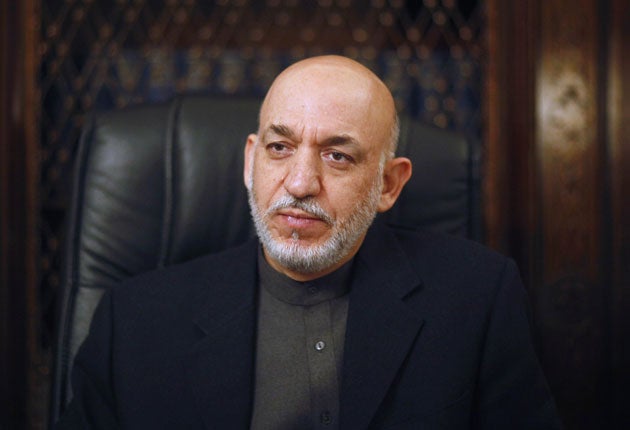Doubt cast over Karzai's new cabinet selections
Allegations of corruption and inexperience dog second attempt to form government

Your support helps us to tell the story
From reproductive rights to climate change to Big Tech, The Independent is on the ground when the story is developing. Whether it's investigating the financials of Elon Musk's pro-Trump PAC or producing our latest documentary, 'The A Word', which shines a light on the American women fighting for reproductive rights, we know how important it is to parse out the facts from the messaging.
At such a critical moment in US history, we need reporters on the ground. Your donation allows us to keep sending journalists to speak to both sides of the story.
The Independent is trusted by Americans across the entire political spectrum. And unlike many other quality news outlets, we choose not to lock Americans out of our reporting and analysis with paywalls. We believe quality journalism should be available to everyone, paid for by those who can afford it.
Your support makes all the difference.Afghan president Hamid Karzai has submitted a new list of prospective cabinet members to parliament a week after MPs dealt him an awkward blow by rejecting many of his first choices.
In place of former guerrilla leaders and their proxies are three female politicians and a number of well-educated technocrats. But parliamentarians and western diplomats in the Afghan capital still warn that Mr Karzai's picks may founder, this time because of inexperience and corruption allegations.
Among those who lost out when MPs rejected 17 of Mr Karzai's 25 original cabinet nominations last week was Ismail Khan, a former mujahedin leader known as the "Minister for Darkness" during his time as energy tsar, due to Kabul's continual blackouts and his suspect human rights record.
Allies of the Uzbek warlord Abdul Rashid Dostum also failed to get the necessary nod from parliament in what a number of analysts hailed as a bold step forward by a legislature that rarely has the chance to question Mr Karzai's authority. None of the rejected nominees has been put forward again.
Yet those who are on Mr Karzai's new list, unveiled over the weekend, have left many observers scratching their heads. Perhaps the best known of the second wave of nominees is longtime national security adviser Zalmay Rasoul, whom Mr Karzai wants to make his new foreign minister. But few others are household names in Afghanistan.
"One could hardly describe the new list as an improvement over the last," a diplomat in Kabul said. "Many of them are completely unknown. Some of them are known politicians who were removed in the past for corruption."
Afghan MPs were just as damning of the new candidates. "It looks like Karzai has picked them up from the street," Sayed Dawood Hashimi told Reuters, predicting that only four or five would be approved when MPs hold their vote of confidence, which is expected to take place on Thursday.
Other MPs said the new candidates still included people being put forward who were little more than proxies for the ugly tapestry of warlords and strongmen on whom the president depends for political life-support.
Mr Karzai is trying to perform a delicate balancing act of rewarding supporters, ensuring there is adequate representation of Afghanistan's various ethnic groups and satisfying international backers by appointing competent and pro-active ministers.
And the pressure is on to approve a cabinet fast. Since campaigning for the presidential election began last summer, the daily business of politics has come second to electioneering, allegations of fraud, a tortuous and protracted recount, and now a series of delays over the appointment of the cabinet.
It will be an embarrassment to Mr Karzai if he arrives in London for a conference on Afghanistan this month without a government. International backers' demands for reform have an increasingly strident tone and donors are only likely to approve aid to ministries where they feel it can be properly spent.
Among those who did meet parliament's approval last week are the ministers of the interior and defence, who are responsible for Afghanistan's police and army. Other crucial appointments were at the ministries of agriculture and education. These four cabinet members are responsible for national security and kick-starting the economy, key factors in the struggle to defeat the Taliban and other insurgents.
Join our commenting forum
Join thought-provoking conversations, follow other Independent readers and see their replies
Comments